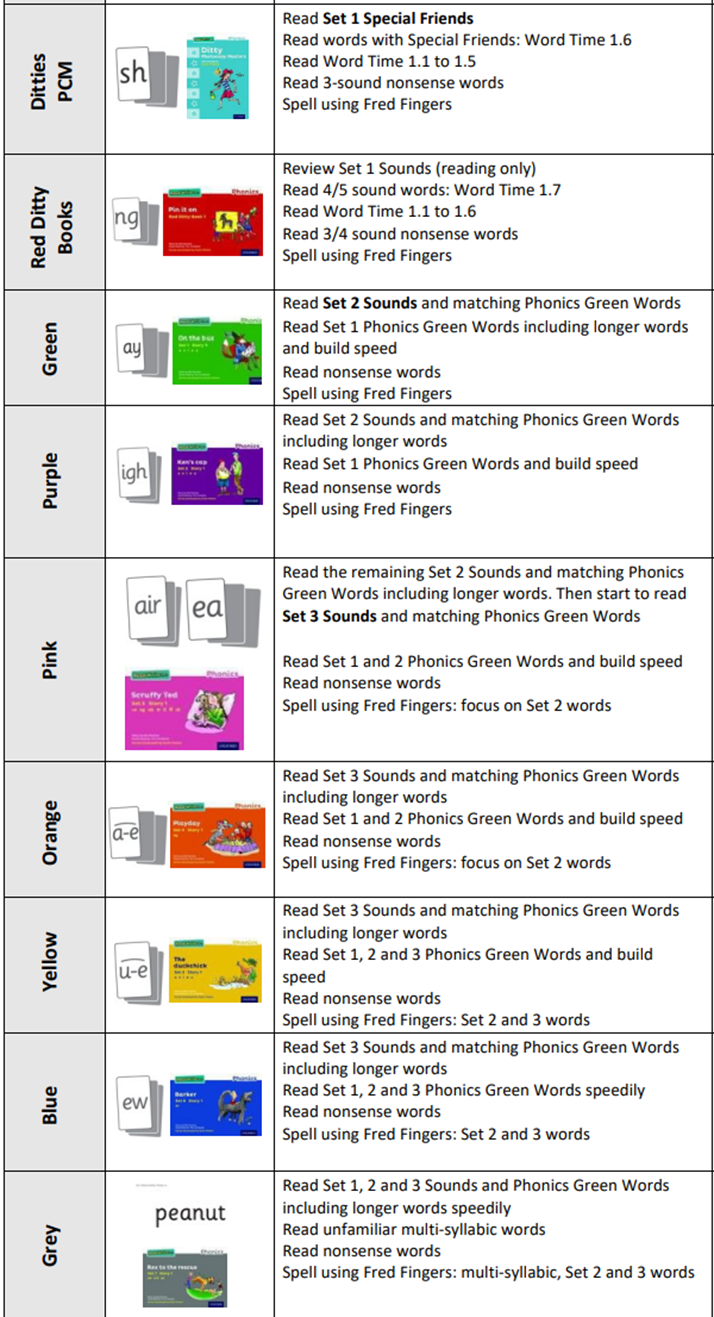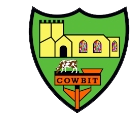Phonics and Early Reading
At Cowbit St Mary’s Church of England Primary School, our phonics curriculum is, planned and sequenced to ensure it meets the needs of our children and shows progression throughout school to enable all children to achieve well. We aim to provide all learners with the knowledge, skills and ambition to be successful readers not only at school, but also for future learning and employment.

Read Write Inc (A Government approved synthetic phonics scheme) is a systematic approach to teaching and developing early reading. As part of this our learners are immersed in an environment which is rich in sounds and vocabulary right from their first day in Reception.
Throughout the Read Write Inc programme, children learn the English alphabetic code: the 150+ graphemes (letters or groups of letters) that represent each of the 44 speech sounds. They learn the sounds and the letter, or groups of letters, they need to represent them in the first section of their daily phonics lessons. The sounds they learn are divided into three sets: Set 1, Set 2 and Set 3. Simple and enjoyable mnemonics help all children to grasp the letter-sound correspondences quickly. This learning is taught and consolidated every day. High frequency words that are not phonically regular are taught as 'tricky' words (we call these Red Words) and are also practised frequently.
Click here to see the Read Write Inc sounds and the order in which they are taught in.
Click here to see the Read Write Inc letter formation mnemonics.
Click here to see the Read Write Inc Red Words.
What happens in reception class?
As children progress through EYFS they will learn all the 44 sounds and the corresponding letter groups. Initially, pupils will learn Set One letter sounds and their matching graphemes. Once the first 10 of these are secured, they will be explicitly taught the skill of oral blending using a strategy called ‘Fred Talk’ and ‘blend’ which is vital for the initial stages of early reading. For example, the teacher would ‘Fred Talk’ the word fox by breaking it down into the sounds ‘f-o-x’ and would then model how to ‘blend’ the sounds into the word ‘fox’.
Once oral blending is mastered, children will rapidly progress to segmenting (splitting up written words into sounds) and blending these sounds together to help them read CV and CVC words.
Once learners in Reception class have learnt their Set 1 Speed Sounds and can blend words made up of these sounds, they will then start to read short stories known as ‘Ditties’, before moving onto Red Ditty Books and then RW Inc. storybooks. These stories are colour-banded as shown below:

The above phonics books are closely matched to the children's increasing knowledge of phonics and 'red' words so that, early on, they experience plenty of success. A thought-provoking introduction, prompts for thinking out loud and discussions help children comprehend what they are reading.
Repeated readings of the texts support not only their increasing fluency when decoding, but their comprehension of the texts read. Children read each story three times. On the first read, children focus on accurate word reading; the second, on developing fluency; and the third, on comprehension. Fluency and comprehension increase with each repeated reading.
Our learners will continue to develop and apply their sound knowledge throughout Key Stage 1 until such a point as they complete the RWInc programme.
Our children love the consistent and systematic approach to teaching and learning and look forward to their daily lesson of Read, Write, Inc with Fred the Frog!
How do I know how well my child is progressing?
All pupils in Reception and Key Stage 1 are assessed each half term by the Phonics Reading Leader (Mrs Leonard) or a trained member of SLT (Mrs Smith).
Children are assessed on:
- Their sound knowledge,
- Their ability to read words featuring sounds that they know
- The fluency at which they can read speedy read words from the level of storybook they are reading
The children are then put into groups based on their reading ability and phonic knowledge. Ongoing assessment means that groups are constantly adjusted to ensure the best progress for each learner.
If we find that a child is in need of additional support, timely intervention is put in place to ensure that they 'keep up’ as opposed to needing to ‘catch up’.
What happens when my child completes RWInc.?
Once learners have completed the Grey Storybooks (usually by the end of the Spring Term in Y2) they will still review ands revise their sound knowledge regularly as part of our academy’s spelling programme: Ruth Miskin Spelling.
What about reading at home?
Reinforcing children’s classroom learning with reading at home is a vital part of ensuring their success at school.
Read Write Inc. Phonics Book Bag Books are engaging texts which support children with additional reading practice outside the classroom. The books are uniquely matched to the existing Read Write Inc. Phonics Storybooks they read as part of their phonics lessons to reinforce children's learning of phonics at the appropriate level, helping them to make even faster progress in reading.
|
Level |
Home Reading |
|
Sounds A |
A lilac book (wordless book)* & Daily practice of speed sounds using the pack of cards provided. |
|
Sounds B |
A lilac book (wordless book)* & Daily practice of speed sounds using the pack of cards provided. |
|
Sounds C |
Sound Blending Book (1.1-1.4) with 3 & 4 letter words to practice reading at home Daily practice of speed sounds using the pack of cards provided. |
|
Ditty Photocopy Masters |
Sound Blending Book with 3 & 4 letter words to practice reading at home A printed Home Ditty Story |
|
Red Ditty |
A copy of the Red Ditty Book they have been reading in class & a Red Ditty Book Bag Book |
|
Green |
A copy of the Green Book they have been reading in class & a Green Book Bag Book |
|
Purple |
A copy of the Purple Book they have been reading in class & a Purple Book Bag Book |
|
Pink |
A copy of the Pink Book they have been reading in class & a Pink Book Bag Book |
|
Orange |
A copy of the Orange Book they have been reading in class & an Orange Book Bag Book |
|
Yellow |
A copy of the Yellow Book they have been reading in class & a Yellow Book Bag Book |
|
Blue |
A copy of the Blue Book they have been reading in class & a Blue Book Bag Book |
|
Grey |
A copy of the Grey Book they have been reading in class & a Grey Book Bag Book |
|
Completed RWInc. |
Once your child has completed Read, Write, Inc. phonics, they will join our Accelerated Reader programme and select from a range of specially banded books in the school library. |
Please note: Book bag Books are swapped once a week as they are matched to the books read in their phonics sessions which change weekly.
*Lilac level books are wordless books that tell a story through pictures alone. They help children to develop speaking and listening skills through creating and telling stories.
You can watch a short video about the benefits of Lilac Books and how to use them with your child below:
https://www.youtube.com/watch?v=TKJcDQNmumo
What is the Phonics Screening Check?
In the Summer term of Year 1 all pupils complete the National Phonics Screening Check. The screening check comprises a list of 40 words, some of which are real and some which are nonsense-words (pseudo words) which is designed to check that your child has age-appropriate phonics skills and is ‘on track’ to become a successful reader. Your child will read each word on a one-to-one basis with a teacher who they know. Including pseudo words allows teachers to assess a child’s ability to segment and blend words to read them. As pseudo-words are new to all children, they do not favour those with a good vocabulary knowledge or large sight word memory. Here is an example of a pseudo word;

Remember, in many ways all words are like pseudo words when you first come across them!
The words in the screening incorporate phonics skills acquired by the children in both Year 1 and Reception. It is conducted in a quiet room without distractions. The Standards and Testing Agency (STA) release a new check each academic year.
The National threshold of achievement in the phonics screening check is usually 80% or 32/40 words. However, this can change each year. Those children in Year 1 who do not meet the assessment threshold will receive additional support and then complete the screening again during the Summer term of Year 2.
In order for your child to become comfortable with the process, he/she will take part in practise checks throughout the year and will practise pseudo words daily during his/her Read Write Inc lesson.
What if I still have some questions?
For further information about the teaching of Read Write Inc and for advice on how you can support your child at home, you can watch these parent/carer tutorials by following this link:
https://schools.ruthmiskin.com/training/units/56
Or alternatively, you can read the information booklets below:
You can also talk to your child’s class teacher or contact the school office to arrange an appointment with our Reading Leader.
